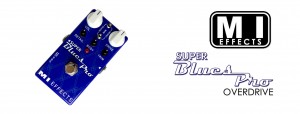MI Audio
NEW SUPER BLUES PRO!

This feedback saw the birth of the Super Crunch Box idea (that is still in prototype phase), and now the Super Blues Pro!
The Blues Pro has always delivered in the low/mid gain overdrive tones, and sounds great through any amp or guitar/pickup combination. As the gain goes up, you can get more compression and super-squishy fuzz tone at a flick of a toggle switch. The mid-focused TS sound is a classic found on a lot of blues and rock recordings, and the Blues Pro took that initial design a step further. That is how the Super Blues Pro was tackled – but what could I add to keep the pedal true to its origin, but extend it a bit further?
First, headroom! Like the new Boost ‘n’ Buff v.3 and soon, the Super Crunch Box, we have added internal voltage multiplying circuitry to boost the operating voltage from a 9V only input, to give the Super Blues Pro 18V supply. This added headroom gives more clarity in the top end and attack and really adds that sparkle for low-gain boosting your amplifier.
Next, I wanted to expand the kinds of overdrive tones that can be dialled in and stand alongside the tone of the original Blues Pro. This has been done with the introduction of the DETAIL, BODY and TRIM controls:
DETAIL – This is essentially like the original tone control on the Blues Pro
BODY – One of the main features of the Blues Pro is a bass/low-mid boost to help get rid of the typical mid-hump of the typical TS type of pedal. The BODY control essentially makes this variable, so you can go for a more mid-focused tone, traditional Blues Pro (with the BODY set to 12 O’clock), or even more low end by cranking the BODY
TRIM – This is essentially a second gain control, which affects the gain in a different part of the circuit. The TRIM and GAIN controls have different frequency responses, so you can achieve a wide variety of tones by adjusting these two controls. The standard Blues Pro sounds can be achieved with the TRIM control set to 2 0’clock.
Finally, I wanted to give users the control of the clipping structure of the overdrive signal – allowing anything from a low-gain, open overdrive tone to the super-compressed, mid-gain fuzz found in the previous version. This is controlled via the two toggle switches, each having three options; Silicon, MOSFET or none.
The interesting thing (which I don’t think has been done before,… I’m certainly not aware of any instances) is the ability to choose the clipping device for each side of the waveform individually. The top switch controls the clipping of the top of the waveform, while the bottom switch selects the clipping device for the bottom of the waveform. This means that you can now experiment with say, diode clipping on the top, and MOSFET on the bottom, or No clipping for the top of the waveform, but diode on the bottom etc.
Another thing to point out as well is that the silicon diodes for the top and bottom are in fact different diodes, to add a slight asymmetry to the waveform in Silicon mode. But this also means that you get a slight difference in the tone and feel of the pedal swap switch settings. Also, the MOSFET mode actually uses the clipping characteristics of the MOSFET itself, not the reverse protection diode commonly integrated into the devices.

The range of clipping tones available include the classic TS sounds of the original Blues Pro, or a range of compressed fuzz sounds, all with varying attack dependent on the diodes selected. As the gain increases and bringing in the TRIM control you can opt for a smooth, mid-rich overdrive a la Dumble amplifier tones, or an open, chiming top-end boost.
I’m really excited about the Super Blues Pro, and I’m really looking forward to getting it into the hands of the Blues Pro fans!
-M